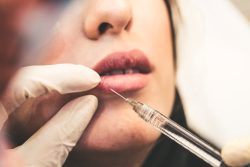My journey into the fascinating world of hormone research officially commenced in 2007, when I joined together with group of psychology and anthropology students who decided to create the Hormones and Disease Group at University of Nevada, Las Vegas. Our goal was to disseminate information about diseases and research via workshops, lectures and presentations to the UNLV community, as well as the greater Las Vegas community. We wanted to not only enlighten ourselves, but to help other students and community members who may suffer from health problems such as Polycystic Ovarian Syndrome (PCOS), endometriosis, diabetes and cancer (to name a few).
Hormone Research, Endometriosis and Misdiagnosis
I became further involved with hormonal research in the winter of 2008 after one of my professors from UNLV’s Anthropology Department introduced me to Dr. Chandler Marrs and the Maternal Health Lab. At the time, I was under the impression (thanks to a misdiagnosis) that I suffered from endometriosis, and with a desire to learn more about myself and other health issues specific to women, I became an undergraduate research assistant for Dr. Marrs. I believed that women’s health research was severely under-funded (a position I maintain), so in my mind, Dr. Marrs and her students were a beacon of light in a confusing, dark world filled with many questions and not nearly enough answers. Personally, I assisted with human menstrual cycle research and the role hormone fluctuation plays in the lives of young women. I believe this type of research is incredibly necessary for understanding the connection between our bodies and minds.
As someone who lived approximately 6 years of her life believing she suffered from a disease she did not have, I understand the desire to self-educate as well as assist others in understanding their own bodies, pain management techniques and alternative treatments. Not only was I coping physically with pain, I had to psychologically deal with my diagnosis and what the possible implications of endometriosis are. I went through a number of gynecologists and it took many years for my diagnosis to be corrected (I had a hernia that was creating scar tissue around my uterus and intestines). The discovery of this was a shock; not only can a hernia be fixed rather easily, I had grown accustomed to the role of an endometriosis patient seeking answers for herself and others in the same situation. However, looking at this from a positive perspective, this misdiagnosis had opened me up to a realm of health I likely would have not been so interested in.
In tandem to my position with the Maternal Health Lab, I have also conducted independent, original research for diabetes and alternative medicine as a student of medical anthropology. For me, food is a large aspect of our lives that can either hurt or harm us; it can be poison or medicine. In my opinion, the link between diet and health is incontrovertible. The more this is part of the public discussion, the further we can raise awareness and help people make better lifestyle choices. Personally, I am curious about the connections that exist between our dietary choices and how they can interact with our hormonal pathways. I believe Lucine Biotechnology is a sorely needed resource for women who are tired of having unanswered concerns and questions and I look forward to contributing to the Lucine community.















Thanks so much, I am honored to be here!
Lauren, it’s great to have you back!